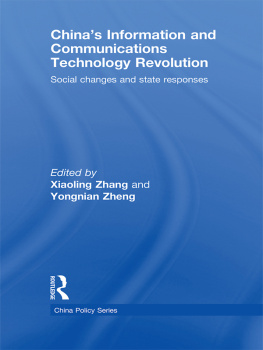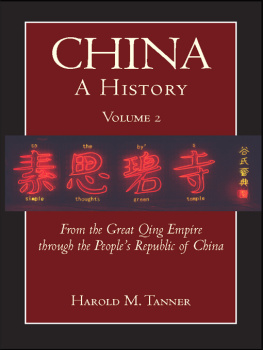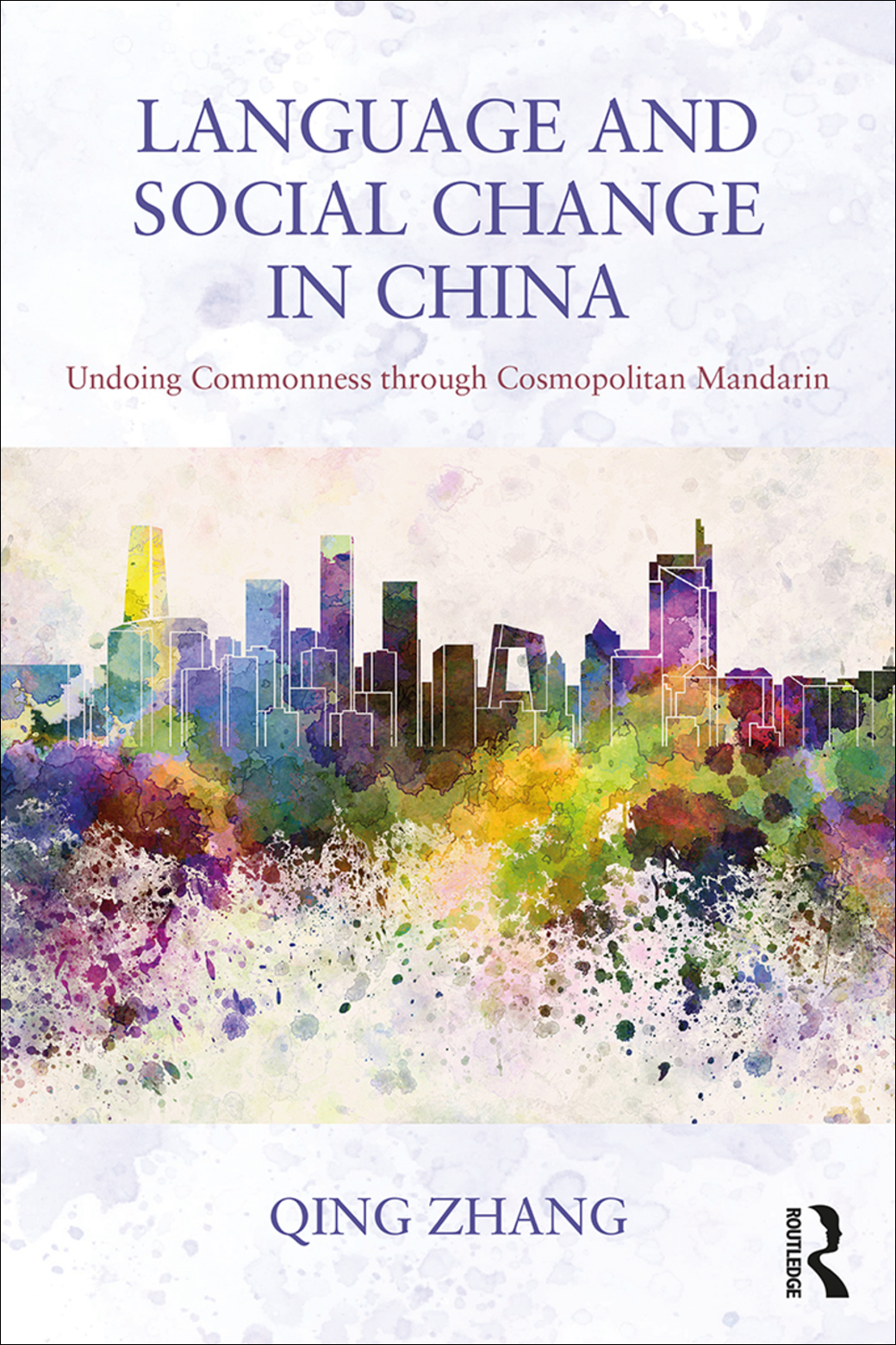Contents
Guide
Language and Social Change in China
Undoing Commonness through Cosmopolitan Mandarin
Qing Zhang

First published 2018
by Routledge
711 Third Avenue, New York, NY 10017
and by Routledge
2 Park Square, Milton Park, Abingdon, Oxon, OX14 4RN
Routledge is an imprint of the Taylor & Francis Group, an informa business
2018 Taylor & Francis
The right of Qing Zhang to be identified as author of this work has been asserted by her in accordance with sections 77 and 78 of the Copyright, Designs and Patents Act 1988.
All rights reserved. No part of this book may be reprinted or reproduced or utilised in any form or by any electronic, mechanical, or other means, now known or hereafter invented, including photocopying and recording, or in any information storage or retrieval system, without permission in writing from the publishers.
Trademark notice: Product or corporate names may be trademarks or registered trademarks, and are used only for identification and explanation without intent to infringe.
Every effort has been made to contact copyright holders. Please advise the publisher of any errors or omissions, and these will be corrected in subsequent editions.
Library of Congress Cataloging in Publication Data
A catalog record for this title has been requested
ISBN: 978-0-415-70807-4 (hbk)
ISBN: 978-0-415-70808-1 (pbk)
ISBN: 978-1-315-88625-1 (ebk)
Typeset in Bembo
by codeMantra
This book is dedicated to Dan and Jing-yi.
Language and Social Change in China
Language and Social Change in China: Undoing Commonness through Cosmopolitan Mandarin offers an innovative and authoritative account of the crucial role of language in shaping the sociocultural landscape of contemporary China. Based on a wide range of data collected since the 1990s and grounded in quantitative and discourse analyses of sociolinguistic variation, Qing Zhang tracks the emergence of what she terms Cosmopolitan Mandarin as a new stylistic resource for a rising urban elite and a new middle-class, consumption-based lifestyle. The book powerfully illuminates that Cosmopolitan Mandarin participates in dismantling the pre-reform, socialist, conformist society by bringing about new social distinctions. Rich in cultural and linguistic details, the book is the first of its kind to highlight the implications of language change on the social order and cultural life of contemporary China. Language and Social Change in China is ideal for students and scholars interested in sociolinguistics and linguistic anthropology, and Chinese language and society.
Qing Zhang is Associate Professor in the School of Anthropology at the University of Arizona, USA.
Contents
Figures
Tables
The seeds of my research in this book were sown at the end of my masters study in China, when I went on job interviews with foreign companies in Beijing and Shanghai and at the same time was awaiting admission letters from graduate schools overseas. With a bachelors degree in English and a masters in linguistics, and no background in business, I crafted myself in the interviews as a linguistic and cultural intermediary for foreign businesses in China. Eventually, I received offers from three multinational corporations and admissions with financial support from several universities in the United States and the United Kingdom. My interest in pursuing graduate studies in linguistics overpowered my desire to join a new breed of Chinese business professionals. That decision shaped the trajectory of my professional and personal life: I have become an academic specializing in language and social change in China rather than one of the Chinese yuppies whom I studied for my dissertation research. I started my graduate studies in linguistics at Stanford University, knowing that I wanted to focus on the relation between language and social change, and where else is a better place to examine the relation than China?
People of my age cohortstarting primary school in the late 1970s when China initiated the opening-up policy and economic reformhave grown up with and lived the drastic socioeconomic and ideological changes that have profoundly transformed Chinese society. The power of language in such transformations has always fascinated me. The Department of Linguistics at Stanford University was where this passion of mine grew from a rudimentary interest articulated in my application statement in terms of speech act theory and cross-cultural communication to a deepened understanding of language as social action and meaning-making resource. Specifically, I became interested in examining the inextricable link between language and social change grounded in rigorous linguistic analysis and cultural theories.
I began to find my own intellectual voice during the writing of my dissertation. I am grateful for three people who helped nurture the voice and shape my intellectual trajectory at its early stage. I owe a tremendous intellectual debt to Penny Eckert, my doctoral adviser at Stanford University. Taking me on as her advisee from the very beginning of my graduate studies, she has encouraged and supported my interest in language and social change throughout my academic career. I draw inspiration from her work on style and sociolinguistic variation and from her encouragement to expand my intellectual horizon, integrating scholarship from other related fields to make greater waves in advancing sociolinguistic theory on language and social change. I am grateful for her unwavering encouragement and enthusiasm in my work, and her comments on of this book. I have also benefited tremendously from Miyako Inoues advice and insights on seeing the broader picture: How linguistic issues come to stand in for larger social and political projects and processes, and how a deep understanding of the local political economies can shed light on the intricacies of linguistic practices. John Rickford, another mentor and member of my dissertation committee at Stanford, whose earlier work on linguistic variation and change in a non-Western, non-industrialized community, inspired me to pursue my research in China. Research on sociolinguistic variation and change has continued to be dominated by studies in Western societies and on English. More research in other societies and on other languages is needed to not only expand the empirical breadth of the discipline but also to strengthen the methodological and theoretical rigor in investigating sociolinguistic change in diverse contexts. This book seeks to offer such a contribution.
The project on the emergence of Cosmopolitan Mandarin at its various stages has benefited from the support of many people. I extend my greatest appreciation to the yuppies and state professionals in Beijing. I am most grateful to them for finding time from their busy schedules to participate in my study. I thank them for sharing with me their professional experiences and their views on the effects of social and economic changes on their lives and their city. Particularly, I would like to thank Mr. Wang, my point of contact and friend, for his enthusiasm in my project and for introducing me to the first six yuppie participants, and I thank Ms. Jiang for getting me into contact with managers in the state sector. I am deeply grateful to Liu Ling of Tianjin Television Station, one of the hosts of the program










